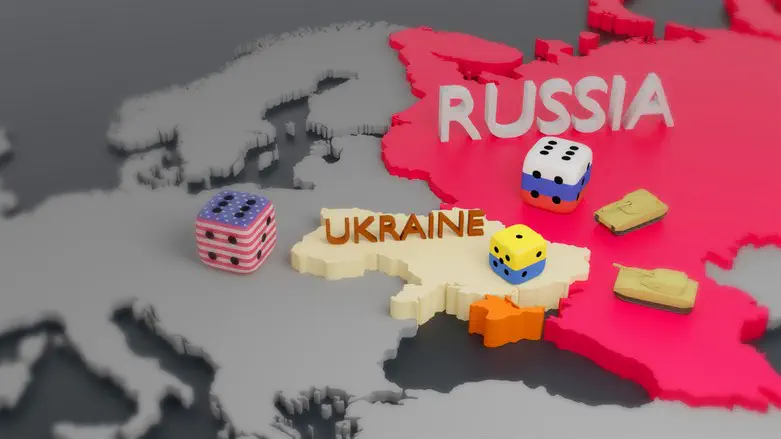
There is nothing new in speaking of the signs of a new world order. That kind of talk started years ago. After the coronavirus epidemic the signs multiplied, and in the institutes of strategic studies all over the world people thought about a post-pandemic world.
In most cases, however, expectations were more focused on the gradual emergence of new rules and on the position of the major international powers within the framework of major strategic interactions confronting international relations in the current phase.
However, the Ukraine crisis accelerated the formation of the rules of the new world order and even added elements to its mechanisms by introducing Russia into the multipolar conflict a little more than was expected or planned. The President of the European Commission, Ursula von der Leyen, had already said before the war in Ukraine that Russia had begun to “undermine” the European security structure.
She said it was a blatant attempt to rewrite the rules of world order. “We cannot let this stand. We are facing a blatant attempt to rewrite the rules of our international system,” she said at the Munich Security Conference. She also denounced a Russian-Chinese alliance that seeks to impose “the rule of the strongest.”
But what the Atlantic allies fear most has already occurred: Ukraine has seen the largest deployment of troops on European soil since the worst days of the Cold War. NATO faces an open and direct Sino-Russian challenge. For the first time, there are unified calls not to admit new members. Indeed, events in Ukraine are not just about restoring Russia’s former influence in that country.
It is primarily about Russia’s strategic repositioning in the reordering of the international system and its desire to assume an international status commensurate with its growing power, role, and influence.
It is true that Russia will suffer from economic sanctions imposed by the West. But it has come to believe that the cost of war is strategically lower than what it perceives as submission to Western conditions. The Kremlin’s security strategic calculus seems to outweigh the economic one.
However, I think it is difficult at this stage to jump to conclusions about the course of the crisis and its possible strategic implications for the foreseeable future.
There is an important reason for this. It is difficult to predict what the main player in this crisis, President Putin, will do next. First of all, he has passed the most difficult phase of military operation in Ukraine, a dividing line between two historical phases.
He has carried out an invasion, albeit a very different one from the Crimean crisis in 2014. This time, the West seemed more united, despite the reluctance of Germany and France and their apparent tendency to avoid escalation with Russia. We must all remember that President Putin had already tested the will of the West in 2008 (Georgia) and 2014 (Crimea).
He has done the same with Russia’s role in the Syrian crisis and in many other regions. So the whole situation seems to be a reproduction of a previous scenario. The same accusations and possibly the same vocabulary are being repeated, including the attack on European values.
But in reality, Crimea has turned into a situation similar to that in Northern Cyprus. No one recognizes what Russia has done. But no one is talking about it either.
President Putin knew what the reaction of the US would be, while Ukraine has put much stock in the West’s position toward Russia, despite all evidence to the contrary, especially from the French and Germans President Putin is repeating the 2008 Georgia scenario in Ukraine, with greater motivation, given Ukraine’s riches compared to Georgia.
Ukraine ranks first in Europe in uranium reserves, second in titanium, and second in the world in strategic minerals such as manganese, iron, and mercury. Add to that the enormous agricultural capacity of the world’s most fertile country, which produces enough wheat, corn and barley to feed some 600 million people, almost more than the entire population of the EU.
Perhaps the quickest result President Putin has achieved in this crisis is to show the world the limits of American power, which inevitably has implications for Washington’s reliability in the eyes of its allies and partners in various regions. I think that was an important strategic lever in his decision to invade Ukraine.
President Biden’s administration is seeking alternatives to deter Russia. It could not pull the military card, for reasons not necessarily related to President Biden’s character,.but primarily to the major crises and challenges facing the US in maintaining its hegemony over the world order. This is exacerbated by the sharp internal divisions in the US in recent years, the impact of the coronavirus crisis, and the rapid rise of China.
This puts the White House in a quandary and makes it extremely difficult to engage in a military confrontation that could hasten the end of US influence or, in any case, open the door to further losses, such as encouraging China to reclaim Taiwan. It could also open the door for other countries, such as Iran, to engage in conflict and challenge US policy more seriously.
I think all indicators, including the crises in Taiwan and Ukraine, confirm that there is a growing global race to fill the strategic vacuum created by the diminishing role of the US. Russia has not only started this race, but aspires to lead it. Moreover, it is also about many other regional and international powers.
All in all, the global balance of power is shifting ever more rapidly. Everyone is trying to secure their place in a new world order after decades of American global dominance.
Dr.Salem AlKetbi is a UAE political analyst and former Federal National Council candidate.
